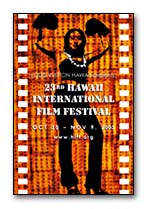
COURTESY OF HIFF
David (Scott Davis, front) is befriended by Duke Kahanamoku (Sean Kaawa) when he is thrown back in time to the year 1911. Kahanamoku teaches David how to surf on the huge ancient surfboards.
‘The Ride’
just misses
its wave
'The Ride" is a charming, well-intentioned film that tries its darndest to capture the sweetness and innocence of Hawaii of a century ago through a back-in-time storyline and the icon of legendary water man Duke Kahanamoku. The movie, however, falls short due to ponderous plot development, some self-conscious dialogue and amateur acting.
This first major effort by director Nathan Kurosawa with an all-Hawaii cast and crew is still quite watchable with its "Time Machine" scenario and some scenes that command attention, though the audience market will be limited with the characters' frequent use of Hawaiian words, pidgin and "local attitudes."
'The Ride'
Part of the Hawaii International Film FestivalScreens around 6 p.m. tomorrow at Sunset on the Beach, Queen's Surf in Waikiki, and 8:30 p.m. Monday at Doris Duke Theatre, Honolulu Academy of Arts
David (Scott Davis) is a self-centered professional surfer from California, whose priorities are making money, attracting beautiful women and dissing anyone around him. During a surf contest at Sunset Beach, he has an accident and nearly drowns, but is saved by a young Hawaiian surfer. It takes far too long for David to learn it's Duke Kahanamoku (Sean Kaawa), and he reluctantly finds himself at a remote, unfamiliar beach -- only it's Waikiki in the year of 1911.
David has been thrust back in time to a period where life is simpler and basic -- oil lamps light homes, there are no cars, the only telephone is at the only hotel, The Moana, and, even more shocking, surfing is done on long, heavy redwood planks.
Dave really likes to say "dude" when addressing his Hawaiian ohana, but it plays into the stereotype image of the clueless, haole surfer. David comes across more angry than dismayed at his situation, refusing to believe it, and is equally mad at the Hawaiians who saved him and took him in. Why? Because they simply won't believe his "dream."
The ungrateful haole message is set early in the movie, as is the easy acceptance of the "pupule" (crazy) surfer by the Hawaiians, especially Kahanamoku, played sweetly by Kaawa.
COURTESY OF HIFF
David falls for Leihua (Mary Paalani).
THE STORY follows David's slow acceptance to his situation that includes learning how to surf the ancient boards and pick opihi with Duke and the legend's friends, and his growing affection for the beautiful Leihua (Mary Paalani), sister of the one-dimensional beach boy character Blackie (Weldon Kekauoha), who is violently opposed to their coupling.
The relationship between David and Leihua develops slowly with mutual respect, despite the sharp contrast between their cultures.
The audience knows that when David travels back in time, he has to return to the present day. This happens when he's saved at the competition, awakening more confused by his "dream" than his near-drowning.
He's been transformed by his spiritual voyage and now disdains notoriety and its perks, heading to Waikiki to see it as it is now.
And this is where the film, unfortunately too near its end, touches the soul in a wonderfully surprising way. As David walks Waikiki Beach among the crowds and towering hotels, he happens onto a 64-year-old beach boy (Kimo Hugho) who's been working the beach since age 16. He's the son of Caps, one of Duke's buddies whom David befriended. In the most understated and best performance in the film, Hugho talks story with the now-enlightened surfer about the old days and his deceased father's memories. He tells David "I wouldn't trade places with anyone." And you believe it.
In this well-crafted scene, Kurosawa shows that less is more, especially with an inexperienced actor. Hugho captures everything "The Ride" has been trying to say about the Hawaii of a hundred years ago.
At Duke's restaurant in Waikiki, David encounters Leihua's granddaughter, a waitress. The actors' few words, eye contact and facial expressions speak volumes about their possible connection.
Kurosawa's message in the movie is about a kinder, gentler time in Hawaii, filled with trust, sharing, respect and friendship. Even though the message takes too long to arrive, "The Ride" is an honest and sincere journey.
Click for online
calendars and events.



